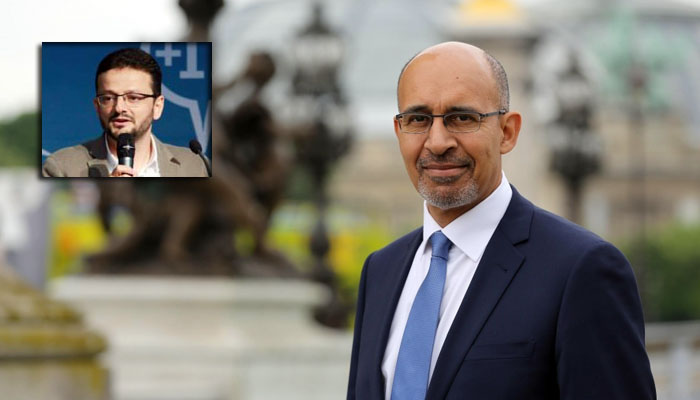Organization for Security and Co-operation in Europe (OSCE) Representative on Freedom of the Media Harlem Désir tweeted on Tuesday that he is concerned about media reports that former art director of the Zaman daily Fevzi Yazıcı was put in solitary confinement and reportedly threatened at police headquarters to admit to having carried a letter that was submitted to a New York court allegedly written by Turkish Islamic scholar Fethullah Gülen ordering judges in Turkey to release several police officers in 2015.
Tweeting from his official OSCE Twitter account Désir also urged Turkey to release all journalists in prison.
“I am concerned about media reports that former art director of Zaman daily @fevziyazici, imprisoned since July of this year [sic], was placed in solitary confinement and reportedly threatened at police headquarters. I urge #Turkey to release all journalists in prison,” he tweeted.
The Committee to Protect Journalists (CPJ) also tweeted a recent Turkish Minute story on Yazıcı and said: “Very concerning development re #journalist #FevziYazici. @RT_Erdogan must stop imprisonment & harassment of #media & #journalists in #Turkey”
According to information obtained from family members, on Dec. 8 Yazıcı was taken to İstanbul police headquarters from Silivri Prison, where he has been in pretrial detention since July 27, 2016. He was not informed of the accusations leveled against him and was not allowed to meet with his lawyers until Dec. 15.
During the interrogation Yazıcı did not admit to having put a letter on his USB or to have brought it from the US. Yazıcı said he visited the US to participate in a meeting of the Society for News Design (SND).
According to sources the İstanbul chief public prosecutor personally participated in the interrogation of Yazıcı and threatened to keep him in detention for 30 days if he did not admit to the accusation about the letter. Yazıcı was taken to Silivri Prison on Dec. 17 and put in solitary confinement with a threat that he would stay there until he admitted to the accusation about the letter. Yazıcı was not given any medication despite the fact that he became ill during his time in detention.
The letter that was publicized 17 months after Yazıcı was arrested was also not mentioned in the current indictment under which he faces three consecutive life sentences for participating in a meeting about a Zaman daily advertisement a year before the coup. He and some other media workers were accused of sending subliminal messages to the military regarding a coup attempt by means of the advertisement.
İstanbul Chief Public Prosecutor İrfan Fidan presented the letter to reporters as “concrete evidence” of a 2015 plot to free some Gülen movement members from prison.
Lawyers of Turkish Islamic scholar Fethullah Gülen denied the claims about the letter, calling it “complete nonsense invented and fabricated” for further false allegations against their client.
News website TR724 says the letterhead and signature of the letter were copied from another of Gülen’s letters and that the letter includes many spelling and terminology mistakes in addition to expressions not used by Gülen.
The authenticity of the letter in terms of wording and signature aside, critics pointed to some important contradictions between the statement of the prosecutor and the chronology of events.
According to Fidan’s statement, Yazıcı travelled to the US on April 8, 2015 and returned to Turkey on April 18, 2015 with the digital format of the letter allegedly written by Gülen on a USB that was seized by police at his home. But the letter was dated April 19, 2015 and the save date on the USB is April 26, 2016. Judges Mustafa Başer and Metin Özçelik, who were claimed to have received orders by means of the letter, released 75 jailed Gülen movement members including media members and police officers on April 25, 2015, a day before the letter was recorded on the USB that was allegedly brought by Yazıcı from the US on April 18.
The 10th Penal Court of First Instance in İstanbul ruled against the release order that same night and stopped the 75 people including Samanyolu Broadcasting Group General Manager Hidayet Karaca and former police officers Ali Fuat Yılmazer, Nazmi Ardıç, Yurt Atayün, Ömer Köse, Yasin Topçu and Hüseyin Korkmaz from being freed.
Korkmaz is a former İstanbul police officer who was arrested by the Erdoğan regime in the aftermath of corruption operations in late 2013 in which Turkish-Iranian gold trader Reza Zarrab and the inner circle of the ruling Justice and Development Party (AKP) government and then-Prime Minister Recep Tayyip Erdoğan were implicated.
Korkmaz became one of the witnesses along with Zarrab in a New York court where Mehmet Hakan Atilla, an executive of Turkey’s state-owned Halkbank, is being tried for violating US sanctions on Iran.
Korkmaz called then-Prime Minister and current President Recep Tayyip Erdoğan the “No. 1” target in a group that also included Mehmet Zafer Çağlayan, the former economy minister, and Süleyman Aslan, a former chief executive at Halkbank, a large Turkish state-owned bank that was central to the sanction-busting scheme.
